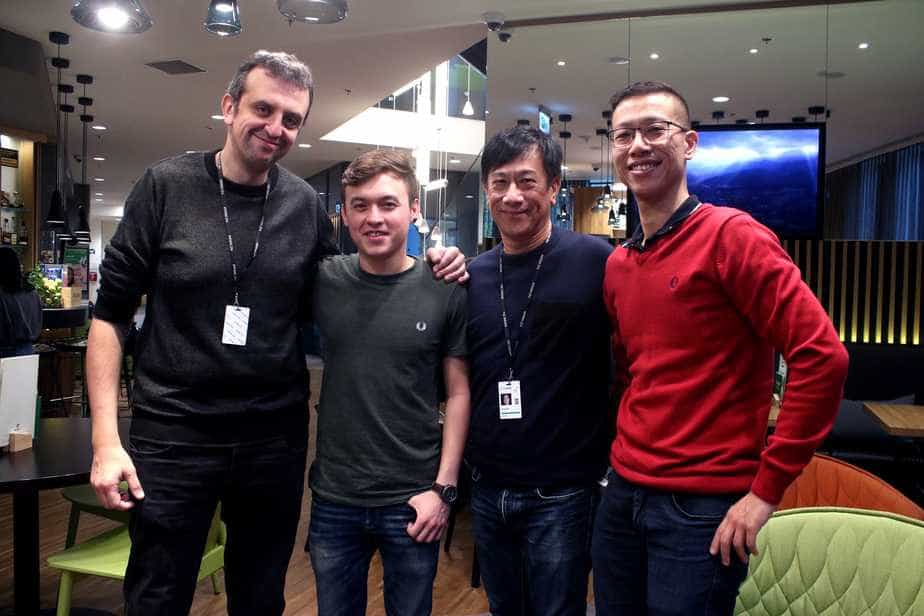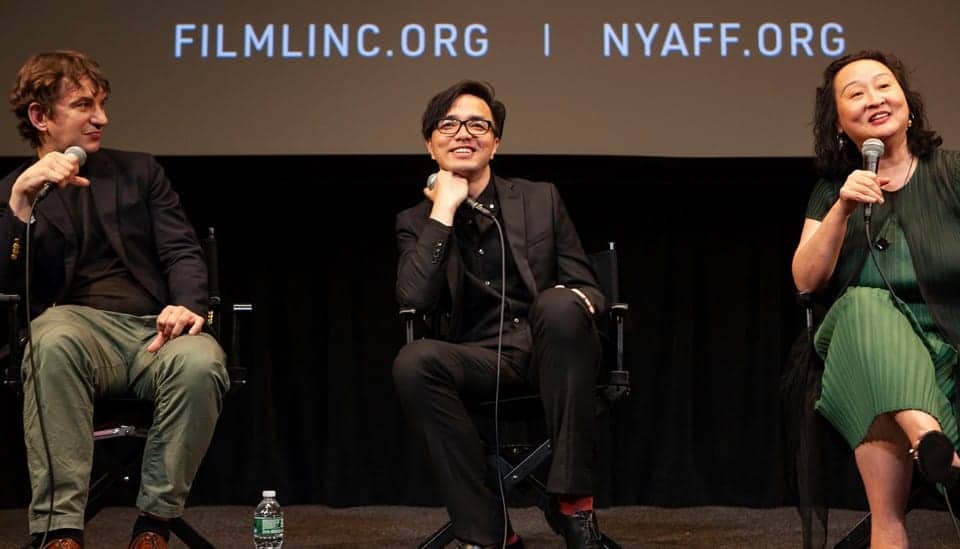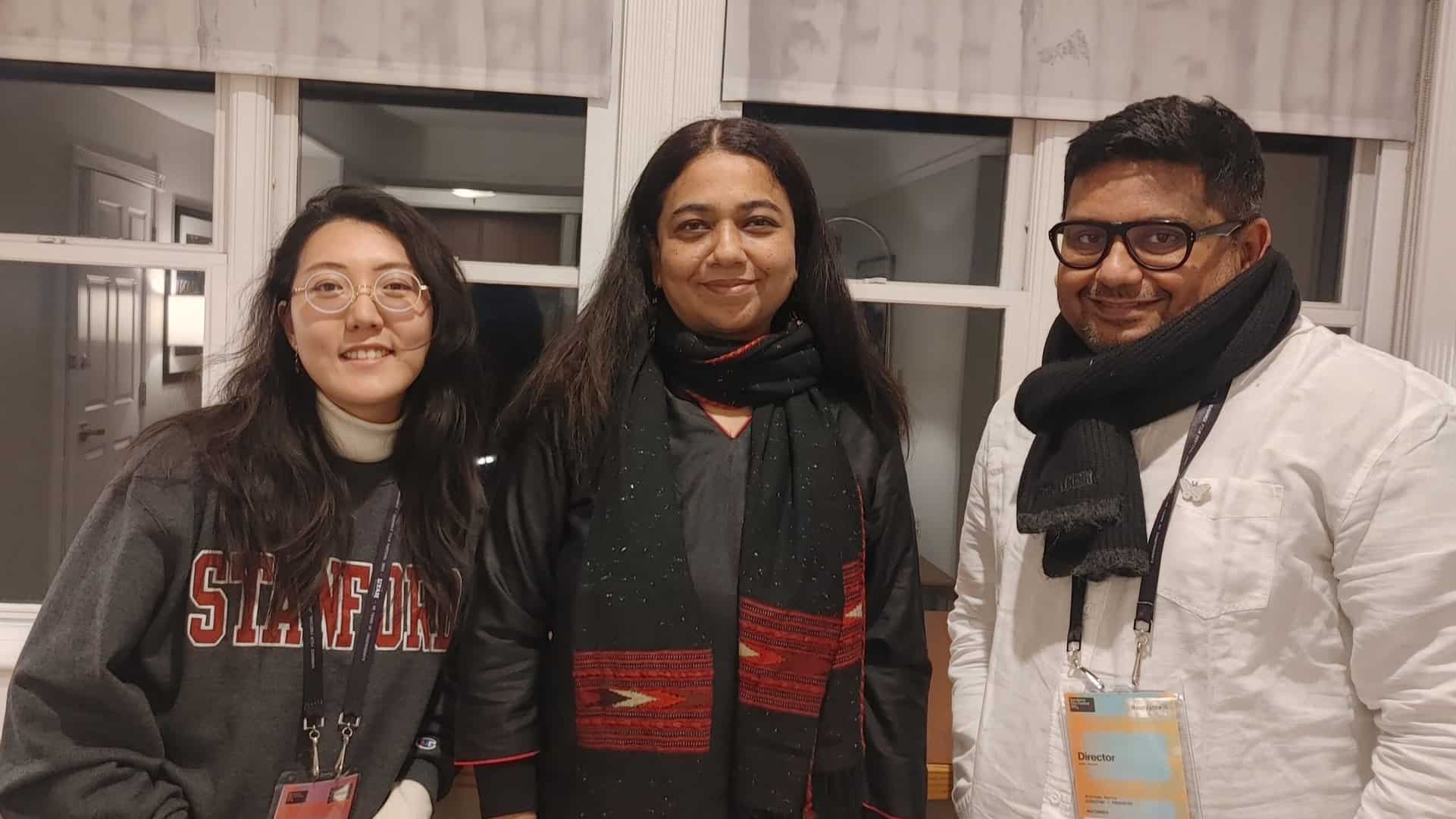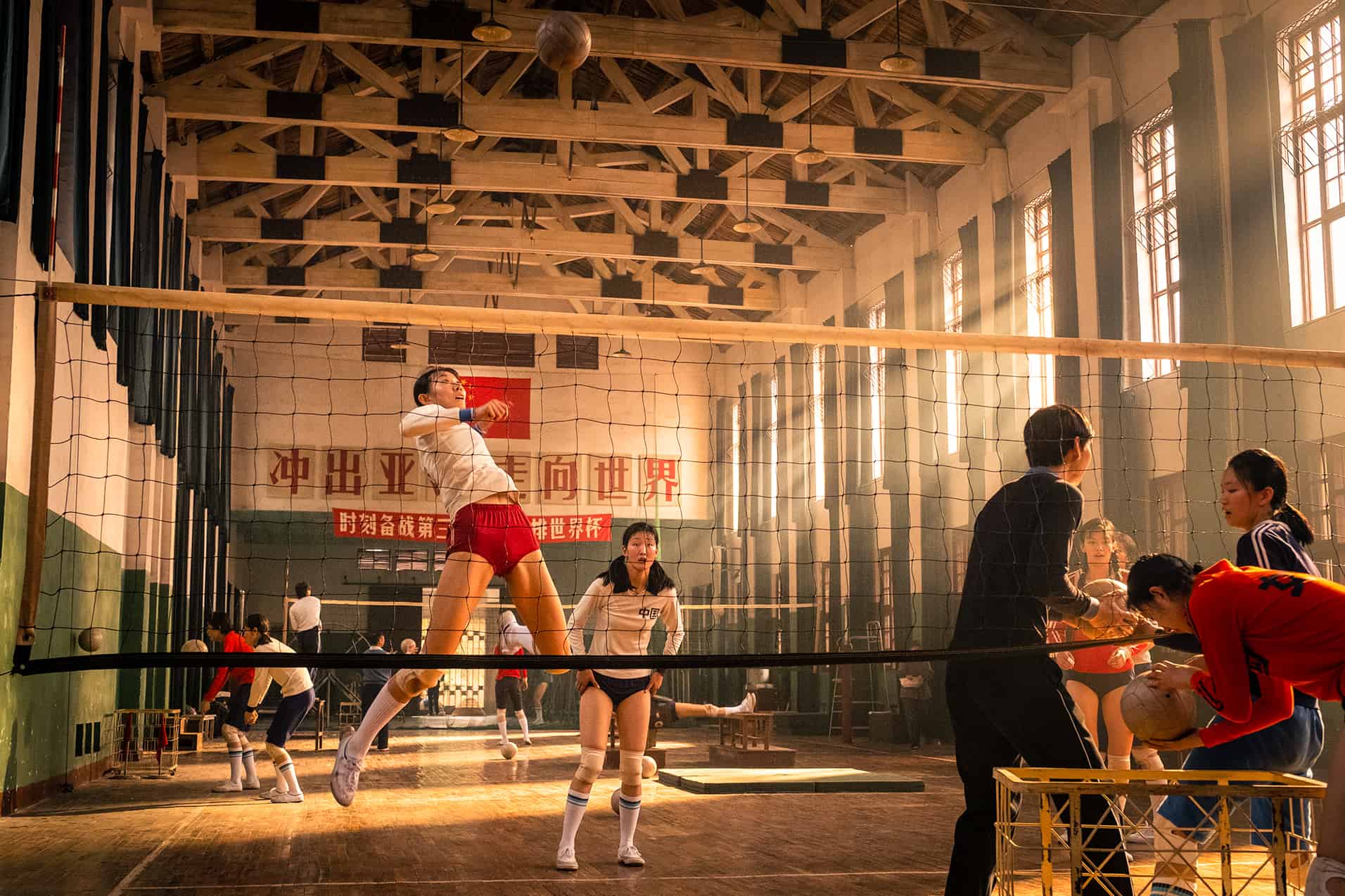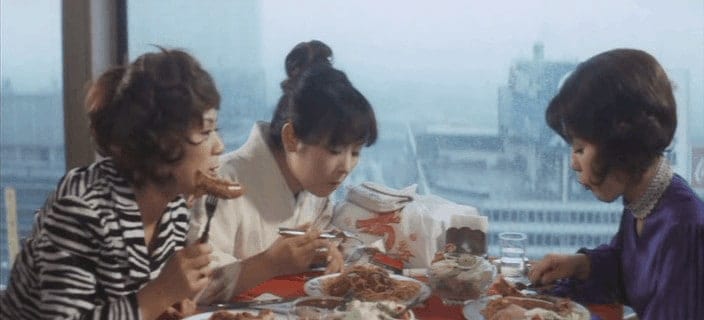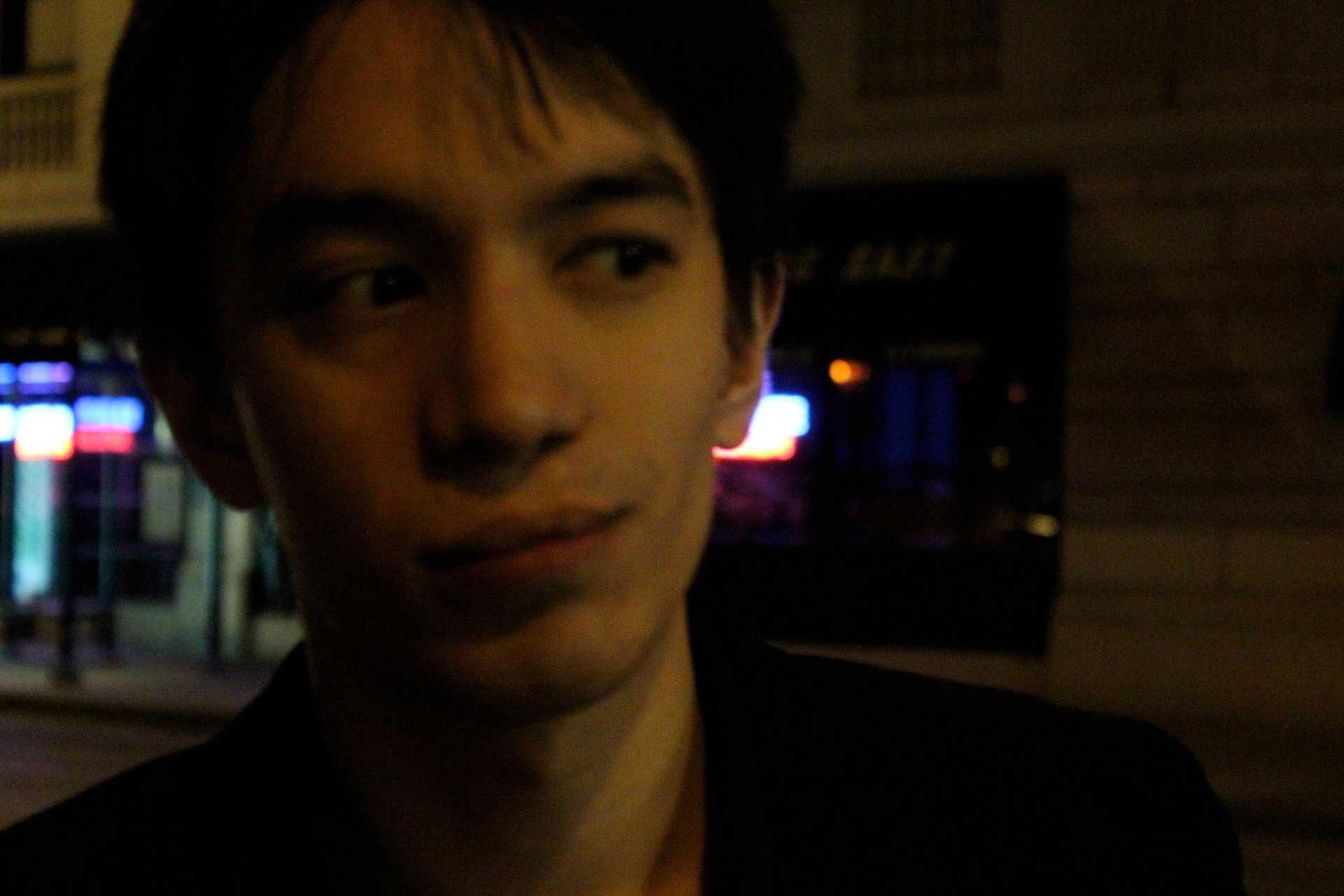Goh Ming-siu is a graduate of Northwestern Universityʼs School of Communications in Illinois, a director and television screenwriter working in Singapore, the author of over 100 episodes of TV series. “Repossession” is his feature-length debut.
Scott Chong Hillyard graduated from Nanyang Polytechnicʼs School of Business Management in Singapore. An actor performing on stage, in TV series, music shows and movies since the age of nine. The co-director and producer of “Repossession”.
Gerald Chew is an experienced actor with many theatrical roles to his credit, also known for his numerous TV series and films (he played, among others, in Boo Jonfeng's “Apprentice”). He also worked as a theatre director and screenwriter.
On the occasion of their film “Repossession” screening at Five Flavours, we speak with them losing your job in your 50's, the endless pursue for money, being identified by your work, Singapore, and many other topics.

The movie begins with the layoff of the protagonist, a man in his 50s. Would you say there is some kind of tendency now in Singapore's corporate world?
Goh Ming-siu: When we were writing the script, there was a series of lay offs in some pretty big companies, in almost the same circumstances as in the film. The media picked it up and the story was repeatedly in the news, and that is actually where we got our inspiration from
Gerald Chew: It is very common today, because Singapore is a country with many big corporations who work internationally, so when there is a big lay off in a branch of a company elsewhere in the world, it also affects Singapore. People who are in these positions and are committed to a lifestyle, like the protagonist, suffer significantly. Furthermore, there is the issue of ageism, from what I know from personal experience, because I also work in that realm. It is common when you reach a certain age, 50+, to be kind of backed off, you are politely (sometimes not) asked to just go. It creates a lot of complexity for people who are used to doing this and suddenly they are not important anymore.
Goh Ming-siu: It is quite interesting also, when we brought the film to Cinequest in San Jose, a lot of people were saying that this is a Silicon Valley story because the people working there are always afraid of losing their jobs
So, it would be difficult for someone in the age of the protagonist to find a job after getting fired?
Scott Chong Hillyard: Yes. Actually my father was retrenched when he was about 50, just like Jim in the movie. After he was retrenched, he did some work but he never became as important as he used to be. So, yes, from my personal experience, it is difficult.

In general though, are there any issues with unemployment in the country?
Scott: Even if they are, it is not something that is widely broadcast.
Gerald: It is better than most of the world, very low. It is not that it is being underreported, it is just very low. However, I know two guys that were in the same situation as Jim in the movie and now they do odd jobs, like driving an Uber, for example. It could happen that you got into the taxi of this man, who used to be a high executive. But even this is not that common.
Can you tell me about the kind of scam/money trading that appears in the movie?
Goh: It is not a scam per se, it is just that there are a lot of investment opportunities in the stock market. They want to make it easier for people to get into it, but sometimes, it turns to a sinkhole for some people, since it is a lot like gambling. It is not illegal, however.
Gerald: Even now, I am getting messages from companies that deal with these things every day, even phone calls from Canada, Russia to get you into this investment scheme about trading options etc. People do not really get money from this, unless they go in high volume.
Goh: Yes, because a lot of people who get into these schemes do not know the market, and if you are not from that realm, it is incredibly difficult to get money.
Gerald: One of the top executives of what we call Monetary Authority of Singapore, which oversees anything that is illegal in the money world, said that they cannot do anything about these schemes because it is legitimate, what we call “boiler rooms”. It is their choice that they are getting in.
How much would the apartment that the protagonist's family lives in, cost?
Goh: About $1,5 million, as we estimated when we were writing the film, but right now it would more expensive, because prices in Singapore go up all the time, it is now one of the most expensive countries in the world. Singapore is not exactly a cash-rich country, because people stick all their money into property and in order to do so, a lot of them take loans from the bank and they are overstretched, which is also like the protagonist's situation.

And how much would his wage be?
Scott: Around $15,000 monthly. When we were first writing the script, we would do the math about if he could afford this apartment and his car. We wanted the protagonist to live just below his means, so he really does not have any leeway left if something goes wrong. This is also why he cannot do much or does not know what to do, when he loses his job.
Goh: Singapore is just one of the most expensive cities in the world to live. Let just say that a Honda Civic would cost around $20,000 in the US, it would cost more than $60,000 in Singapore. The same analogy would apply to an Audi, because Singapore wants to regulate the number of cars, so if you want to buy a car, you have to buy a certificate that allows you to buy the car first, so a lot of the money go towards this.
Scott: Just the certificate costs about $25,000, this piece of paper that allows you to buy a car, and actually, it only lasts for 10 years.
Gerald: Everything in Singapore is highly regulated, so in this sense, you have to follow the rules socially, emotionally and psychologically; you have to play this game, otherwise you will be out.
Goh: It is like, “this is what you have to do to have a good life”. It is a straight path.
Would you say that Singapore is a very strict country regarding the law? There is still capital punishment there, right?
Gerald: Yes, for drugs. The law in Singapore is applied to its full extent, there is no flexibility, you cannot negotiate with a policeman, for example. One of the most onerous concepts of the way the law in Singapore applies is when somebody attacks you and you retaliate, both of you are considered to have broken the law.
So what do you need to do in these situations?
Scott: We kind of joke that in these situations, you must put your phone out first and start recording. It is like, someone attacks you, and you choose to retaliate, even if you throw one punch, you will both get handcuffed. You just try to avoid it.
Gerald: The law is like that, you can say that it even modulates instincts.
Can you tell me a bit about the title in connection to the narrative?
Scott: It applies to two different aspects, for example, the bank tries to repossess his house. But mostly it refers to the repossession of this evil entity, that has been in his life since he was young and now comes back in different stages, repossessing people around him.
Why does he has this mentality though, after he is fired, not being able to tell his wife.
Goh: I think it depends very much on the individual's psyche, he is someone who is very old school and chauvinist and having values that dictate that he is the provider. So when he loses his position, he kind of loses his mind. You can hear stories like his in Japan, of people pretending to go to work and hung out in parks instead, and that was kind of what we were looking for.

Would you say that there is also some blame from his wife's side, because she does not understand that he has been fired for that long?
Scott: It is a long time, but at the same time, they both go to work, he in the company and she in the organization and at the time, she is trying to make a longer project work. I would not say she should have noticed, maybe she should have noticed a few small things but she is not to blame for not picking up. Also, Jim did a really good job hiding the fact, getting dressed, leaving at the same time.
Gerald: Jim is the typical patriarchal man and he believes his wife is also part of that system and if you ask women now, they would say that they prefer honesty than being subscribed to some system that was created for them. That shows up in the film as well, his projection of her. She believes something that is a fiction until it is revealed. And these things happen at the same time, the male and the female point of view regarding her and that was a very interesting aspect.
Jim experiences a transformation, as the story progresses, he becomes more paranoid. How was your approach in that aspect of the character?
Gerald: I tapped into my experience, because I also work as a freelancer, and if you work in the industry as an actor or director, you just jump from project to project, and when you are not working, basically, you are nobody. In the case of actors as myself, the question is, “if you are not acting, who are you?” as opposite to people with “normal” office jobs, like executives and project managers let's say. I just tapped in my own experience as a starting point but also in the things that are all around me. There is a sense of paranoia that comes from restriction and what happens when you do not follow the program; you do not have any answers then. This was driving some of the emotional behavior.
Scott: I believe that, in Asian countries, there are a lot of things that are complicated, like the concept of how you are defined. For example, Jim is supposed to be this senior engineer in a big company, he has worked there for almost 30 years. So when he says that to people, and the fact that he drives a continental car actually defines him. Furthermore, when we were writing the character, we wanted to show that he is someone who could be comfortable in a condo, but he goes a bit over his capabilities, he goes to buy a penthouse. He is trying to reach a higher class and when this crumbles, he does not really know how to put across the fact that he has failed.
Goh: In Singapore, there is this system where there is no minimum wage, there is no control of how much you can get paid. There is a scene where Jim is looking at the people working on the street, and these people just make a couple of hundred dollars from what they do. So Jim at that point, is looking at that man and he is seeing himself, potentially.
Gerald: You asked me before about the way I played Jim. I think Singaporeans are very aware of this society and its various aspects and that is why it was easier for me to access this paranoia, because it is in there in all of us, because we know what we need to do to survive and not go below our status. So, it is just a matter of amplifying it for the film.
Do you find it a bit sad that people are defined by their line of work?
Scott: Firstly, I think when you are living in one of the most expensive cities in the world, naturally, you are going to worry every minute about money, what you have to do to continue making money, which is partially why people delve into the trading business we mentioned before. And it is a very common thing in Singapore, like Jim's friend tells him, for people to try and stop those who decide to invest in that sector. At the very core of this whole concept is the fact that when someone asks you, “what do you do?”, they are not trying to understand if you are happy, they just try to find what your “value” is, how much you are worth. So, you become defined by what your job is and how much money you make.
Goh: Also, Singaporeans are known for their pragmatism, so, as Scott was saying, what you do defines your value in comparison to other people. And what you do is tied to how much you make and, for some people, this is how they perceive themselves and their status, by all the things that represent this status, which is Jim's main flaw. There is also much pressure from the “environment” of the country, which is very consumerist, something that actually applies to the whole world; the more stuff you buy the better you are supposed to feel about yourself
Gerald: I was having this discussion last week with a friend of mine and, as you said, we were discussing about how we are defined, more and more, by what we do instead of who we are. People do not care about what our moral code is or our value system. Instagram culture, for example, is a symptom.
Would you say that family as an institution, is declining?
Scott: I would not say it is declining, but I would say it has changed to some degree, but generally speaking, in Singapore still family is in the core
Goh: Maybe the rituals of family have evolved or degraded, things like having to eat dinner together every day,, for example. But since now we all work more and more, it would be difficult to happen and in that sense, some parts of the concept are being taken away by necessity.
Gerald: Especially in the big cities, like Singapore, Tokyo and Hong Kong, very frequently there is this phenomenon taking place, where work is becoming more and more demanding in terms of hours and people tend to live by themselves, leaving family rituals behind them. It is complicated in Asia I suppose, because there is tradition but there is also the new consumer mentality, “I am what I buy”.

The scene where Jim listens to his daughter and her friends talking about having sex is quite awkward for him. How do you think he felt at the moment?
Goh: It is even more awkward for someone with Jim's mindset, who considers his daughter a proper lady; having to hear this discussion is more than uncomfortable.
Gerald: I think if someone decides to take up this job, driving people, he could come across anything, everybody, even his own daughter. So, it is a perfect situation for him to face another side of his daughter that he did not know, but also that he did not want to know. It is also one of the consequences of his world crumbling.
The film begins as a social drama, but eventually becomes a horror. Why did you choose this approach?
Goh: Structurally, we were inspired by Takashi Miike's “Audition”, that movie has stuck with me for the longest time.
Scott: Goh was actually the one who brought up this idea, shifting genres at the midpoint. Initially I could not understand this, but as we thought more about this aspect, I thought that this might actually work and besides that, Singapore movies are kind of known for their drama and we wanted to have this pleasant surprise for the audience, how they experience the movie.
Are there any other influences you had for the film?
Goh: Oz Perkin's “February” (a.k.a. “The Blackcoat's Daughter”) was very influential in mood and also how we saw the performances of the possessed people being. Kiyoshi Kurosawa was influential in mood and tone for the creepy scenes. The dramatic portions we modeled after European arthouse cinema in general (handheld camerawork with motivated camera moves)
Can you tell me about your approach towards the cinematography of the film?
Goh: As we mentioned before, in Asian countries everything is always a bit complicated. We wanted it to be open to interpretation, whether what was happening was real or if it was just in his head. We did research schizophrenia, and we asked experts what the symptoms are, the visual and auditory hallucinations, what age does that kick in, what is the trigger and we tried to incorporate that into the movie.
Scott: Even the flashbacks are very specific in where they are placed, when the schizophrenia kicks in and Jim remembers his military service.
Is it compulsory in Singapore? And how many years does it last?
Goh: Yes, it is compulsory and lasts for two years. Actually, Scott is co-director because he was doing his military service at the time of the shooting and he could not be in the set every day.
Scott: Why the bad planning? We started writing some time before I had to go to the army, and we had a plan and all, but we did not manage to get money and things were pushed back a few months. But I was always going to go there, and so we agreed to proceed and I would come to the set whenever I wanted.
Goh: To come back to your question about cinematography, we differentiated between handheld shots and steady shots, with the latter representing what is happening to his head and the colors being a bit different in those scenes, a bit more intense. We did this because we wanted the audience to feel the difference instead of registering it.
Scott: The main difference between the two is that one could be fantasy, that is how we differentiated them. But we still wanted the audience to understand which is which, and the reason behind what he does and how it is possible.
Goh: Regarding framing and composition, we took a lot of inspiration from Edward Yang, I love the way he frames his scenes and the blocking that goes on. Where the characters are standing in connection with what is actually happening on screen, which says so much. We explained this to our DP, so there are a lot of scenes where Jim is in a frame within a frame, and even a frame within a frame within a frame.
Can you tell be a bit more about the casting? How did you manage to have Amy Cheng in the movie, who is quite famous after “Crazy Rich Asians?”
Goh: To tell you the truth, more than 80% of the cast are friends or friends of friends. I wrote a TV series some years ago , “2025” where Gerald and Amy played a married couple. We were actually going through our phone lists to find the appropriate actors.
Scott: Singapore is a small industry, TV and film even more so. And the procedure was more like we were writing the script, and I would say, “I could really see Gerald rocking this scene” and that is how we decided the casting.
Goh: We only had auditions for a few roles, the boy and the daughter; Scott knew Rachel already, but I did not so we auditioned her first. For the parts that have a few lines, we just called our friends and asked for a favor, and thankfully, all of them said yes.
Regarding Gerald's acting process in the role, before we began shooting, we were able to have several rehearsals between him and the other actors, where we were able to work on the characters' shared histories with each other and their relationships. All the main actors were collaborative partners with us in this, and together we created backgrounds for all of them which the actors carried into their roles and performances. Some scenes were even rewritten based on this workshopping process. Most of our cast is from theatre, so they were familiar with this process and enjoyed the collaborative nature of it.
What is the situation with the Singaporean movie industry at the moment?
Gerald: It is growing but is still a very small industry. Increasingly in the last ten years there has been more output, in two strands. One for mainstream audience; for example there is a series of army comedies because all men in Singapore had this experience of the army, so half the population can relate to it. There are also small independent films that go out into the festival circuit, where you can see the different aspects of society. Films like “The Apprentice” and “Yellow Bird” and “A Land Imagined” had some successes, internationally, and it is good to see local efforts being recognized.
Goh: What I would like to see is a little more diversity, both in mainstream and independent, because due to this mentality we have been mentioning before, people are afraid to take risks here.
And what about the TV industry?
Goh: Because there is only one national broadcast channel, everyone is doing work for them. The stories, I would not say they are limited but there are limitations, due to the ratings.
How is the situation for actors? Are there many roles?
Gerald: Still in Singapore, acting is not considered a main profession, like in Korea or Japan, here it is more like people asking if someone can make a living out of it. You have to be a brave soul to do it, and the fact that the industry is small comes with various advantages and disadvantages. It is easier to know everybody and get work, but at the same time, the disadvantage is that it is very people-driven, so it depends much on whether specific people like you or dislike you. If you are a popular actor for a TV station, you are pressured to conform to a special idea, and be scandal-free etc.
Goh: I think in Singapore it is still very difficult for an actor to make a living solely from acting, to make ends meet. Many actors have to do some freelancing
Gerald: For example, I did some teaching, regarding theater studies in the university
Can you tell me about your future projects?
Goh: We are developing a psychological thriller, a kind of a feminist take on the serial killer concept. Kind of inspired by “Heat”.
Scott: And also a horror comedy, about ghosts who decide to migrate elsewhere.
Gerald: Nothing definite, but I have been working on a few theater scripts to be performed later. And I would also like to do my own thing at some point, but because film is so big in terms of production, probably some theater projects.


